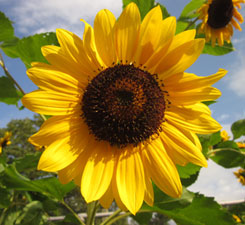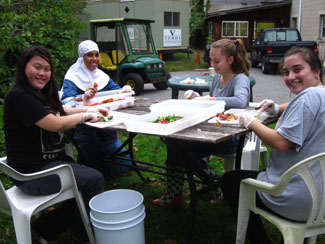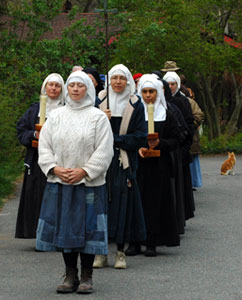
 |
|
“…involvement with the land and nature…is an essential element of the spirituality of Regina Laudis. ”
Constitutions of the Abbey of Regina Laudis, Paragraph 39. “The Nuns are aware that their monastic vocation calls them to contribute to the building up of the kingdom of God by the witness of their lives and with a 'hidden apostolic fruitfulness'. They recognize that the order of this building process begins with the building of the earth and society. This position exacts a searching integrity of approach in all the community’s endeavors, so that the effects issuing from each communal undertaking serve a fruitful restoration of the order of creation….the level of justice involved in this work [includes] care of the land and its produce…. ”
Constitutions of the Abbey of Regina Laudis, Paragraph 44.
|

For then are they truly monks when they live by the labor of their hands, as did our Fathers and the Apostles.…
Rule of Saint Benedict, Chapter 48
 In keeping with Benedictine tradition, the Abbey vegetable gardens and small fruit plots (blueberries and raspberries) are the source of much of our food through the year. We are fortunate to be able to use our own compost to fertilize and enrich our soil and we garden using organic practices. The gardens embody the stages of creative process, as we move from rich brown earth in early spring through to the harvest times, with many hands helping at each phase: planting, weeding, cultivating and harvesting till the produce is brought to the preserving department and the kitchen for further transformation and, ultimately, consumption by community and guests.
In keeping with Benedictine tradition, the Abbey vegetable gardens and small fruit plots (blueberries and raspberries) are the source of much of our food through the year. We are fortunate to be able to use our own compost to fertilize and enrich our soil and we garden using organic practices. The gardens embody the stages of creative process, as we move from rich brown earth in early spring through to the harvest times, with many hands helping at each phase: planting, weeding, cultivating and harvesting till the produce is brought to the preserving department and the kitchen for further transformation and, ultimately, consumption by community and guests.  Our vegetable gardens, which include both traditional and raised beds, while not open to the public at large, are a rich medium of exchange with our interns and guests, whose help is readily accepted! Mother Margaret Georgina, B.S. Horticulture, trained as a horticultural therapist, is responsible for the Abbey vegetable gardens and small fruit plots. She coordinates the work of our guests in the monastic gardens. Our vegetable gardens, which include both traditional and raised beds, while not open to the public at large, are a rich medium of exchange with our interns and guests, whose help is readily accepted! Mother Margaret Georgina, B.S. Horticulture, trained as a horticultural therapist, is responsible for the Abbey vegetable gardens and small fruit plots. She coordinates the work of our guests in the monastic gardens.
For all of us privileged to participate in the raising of vegetables and fruits, the gift of growing food for the community and guests deepens our understanding and experience of what it means to be a Eucharistic community. Mother Margaret Georgina Patton  By long tradition, we “bless the gardens” each spring on April 25th, the Feast of St. Mark, a ritual that reminds us that the cultivation of sacred space is a privilege and the fruits of the earth are gift.
By long tradition, we “bless the gardens” each spring on April 25th, the Feast of St. Mark, a ritual that reminds us that the cultivation of sacred space is a privilege and the fruits of the earth are gift. The tradition of this procession, also known as the rogation procession (from the Latin rogare, meaning “to ask”) goes back to pre-Christian times. The procession at that time, within a festival called the Robigalia was in honor of the God Robigus, seeking his protection for the fields and gardens from blight. The Church assumed this springtime ritual into a new dimension, held in honor of Christ, first fruits of all Creation, prefigured by Jacob in the words of his father Isaac: The odor of my son is as the fragrance of a field that the Lord has blessed. We keep this feast and this custom of singing the Litany of the Saints while processing through the gardens, in prayer that the Lord, the source of all increase, may bless the crops to come, and that through this blessing many may be nourished!
GALLERY In the vegetable gardens, beauty and flavor come together!
Monastic Interns and Abbey Guests Share in the Work of Gardening and Preserving the Harvest
Young Gardeners in the Abbey's Raised Bed Gardens
Annual Procession and Blessing of the Gardens, Feast of St. Mark
|
||||||||||||||||||||||||||
| Copyright © 2013 Abbey of Regina Laudis. All rights reserved. | |||||||||||||||||||||||||||